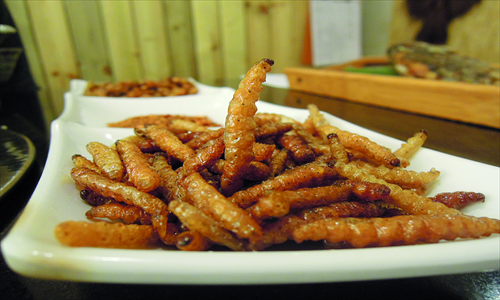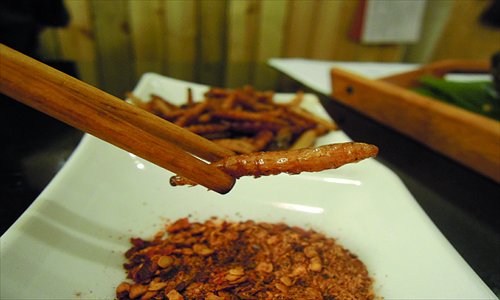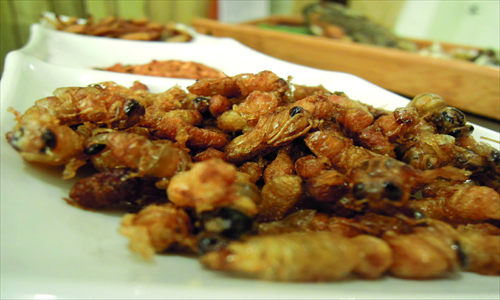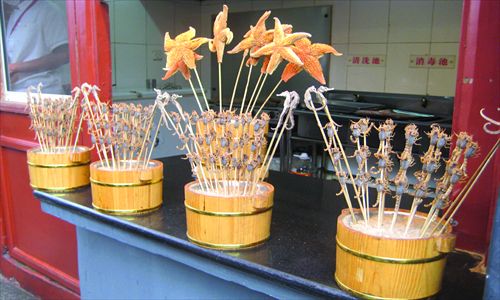Fancy this grub?




Next time you find a bug in your food, don't scream in horror or yell at the waitress, because people here in Beijing are actually paying money to eat insects.
When a plate of fried bamboo worms and bee pupae was served on his table, Zhao Jizhe, a 23-year-old Beijing resident from Chaoyang district, was really excited. "Oh, it smells really mouth-watering!" he exclaimed.
The fried bugs swamped the plate. They were golden in color, smelled of oil and were served with specially made pepper powder. They were crispy and fragrant, like burned shells of shrimp, with a sensuous after-taste.
Zhao is quite an insect food maniac. He has tried and loves scorpions, cicadas, silkworms and grasshoppers. When he hears of a restaurant that is serving good or new insects in town, he cannot wait to go.
But the curly wings and tentacles freak out Liu Xiaoyang, Zhao's friend. Liu finds bugs terrifying and eating them is beyond his imagination. "I would not dare to try," said Liu.
It's a 'bugquet'
Bugs are disturbing, but tasty apparently. It's an interesting contradiction.
Scorpions, chilopoda, cicadas, silkworms, spiders and some other creepy things bunched on sticks are displayed at food stalls along Wangfujing Snack Street. Some of the scorpions are still alive, waving their little legs and poisonous tails trying to escape, which frightens people but also attracts them to watch, buy and take photos.
Zhao Zherui, 18, who works at one of the stalls frying bugs, told Metro Beijing that his creepy crawlies are very popular. "We sell 200 to 300 scorpions every day," said Zhao.
A tourist from Poland surnamed Artur had never seen this kind of exotic food before in his life, so he tried a spider to see how it tasted. "It was crispy and a little spicy," said Artur, "I liked it and I plan to try one of those silkworms later."
But his daughter, Natalia, found the bugs "kind of disgusting" and refused to taste any.
Some love insects as food while others run away from them. But in general, eating bugs is fairly popular in Beijing.
The most popular insects in Beijing are silkworm pupae, cicada nymphs and grasshoppers, and the common cooking method is deep-frying, as Zheng Mingjiang, a chef with 15 years' experience of cooking, told Metro Beijing.
Bi Yan'gang, 32, is an owner of an online food store, Grandpa Bi's, selling all kinds of local specialties from Shandong Province, including insects. Bi sells 400 kilograms of cicada nymphs every month and most of his regular customers are from Beijing.
However, Beijingers are not as crazy about bugs as those people from some other places, such as Yunnan Province.
Yunnan has the largest variety of insects in China. Local people fry, boil, bake and steam ants, crickets, wasps, bamboo worms, dragonfly larvae and the likes.
"Some even eat bamboo worms alive, since the raw worms go well with alcohol," said Zheng.
Zheng runs a Yunnan restaurant in Chaoyang district called Encounter. Having tested many insects on Beijingers, Zheng finds the bamboo worms and bee pupae are the most liked. "We sell more than 200 plates of fried bamboo worms every month," Zheng said.
Foreigners in Beijing like Zheng's bugs too. "Many are attracted by the pictures of creepy bugs on the menu," said Zheng.
Crawling back in time
Entomophagy, or insect eating, has a long history in China, with insects being among the original specialty foods in China. The Chinese eat 76 kinds of insects for food or for medical purposes, as recorded in Bencao Gangmu, a classic Traditional Chinese Medicine (TCM) book.
Now insects are chic again. They are the new gourmet trend, appearing on the menus of many restaurants. "People are getting tired of pork, fish and beef now, and they want something new from time to time," said Bi.
Food made of insects becomes quite a novelty, not least because they are eye-catching and hard to get. Most of the insects cannot be cultivated but can only be collected by hand from the wild. So many people believe insects are healthy and organic.
Every summer, after a big rain, villagers of Zhubian Town, Shandong Province, go into the woods to search for cicada nymphs. Then Bi comes to collect the cicada nymphs. They are immediately frozen, packed and flown across the country, so that people can enjoy the novel snack.
Bugged out
Insects, especially in the larva stage, are rich in protein, fat, vitamins and minerals, as Yang Wenjiao, a senior nutritionist, told Metro Beijing.
Edible insects can be used to treat diseases too. "For example, scorpions are good for people who suffer from a tumor or a stroke," said Li Zhengqing, a TCM doctor with 45 years of clinical experience.
However, care must be taken to ensure that the insects are thoroughly cooked. With dangers of viruses, bacteria and parasites existing in wild insects, collected insects are not safe, not to mention they might contain excessive chemical residue. "It's very risky to eat bugs alive," said Yang.
Li also warned people that "although poisonous bees, scorpions and chilopoda can be edible, it's definitely very dangerous to eat too many."
But all of this won't stop the gluttons munching down on them.
"Still, it reminds me of the days when I was a little boy, catching grasshoppers or cicadas in the woods and looking forward to toasting them on an open fire," recalled Zhao. "It's a memory that I don't want to lose. After all, they really do taste pretty good."